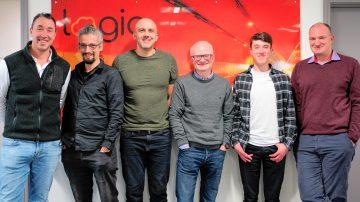If you’re an aspiring inventor, you should read this. Inventor Brian Harrison, whose company Brintal has created a revolutionary new wheelchair called the Ypush, explains to Channel Eye how having a great idea is only one part of the story.
Brian Harrison could be the personification of the phrase ‘persistence pays off’.
After several years at the drawing board, toiling through the various stages of product development and coming up with various new components for a game-changing wheelchair, the next stage for Brian was finding ways of getting it manufactured and telling the world about it.
“The funny thing is, it’s really easy to look back over a project and say ‘that’s the way it should have been done and that’s the way it shouldn’t’ but it often feels like walking into a cul-de-sac, because you don’t know what to do. All the common advice you are given is mostly completely wrong. People say, ‘go and see this person, go and see a company like Dyson, what about G-Tech products’.
Never give up
The road to success is clearly long and winding and there are many side roads along the way.
“We went down lots of different avenues and had lots of different hopes that somebody would help us to wrap the project up early, but we realised that companies who have their own engineers and development teams are not keen to spend money on other company’s projects. The process is way, way longer than ‘thought about a great idea, got somebody to make it, and it’s being sold, off to the Caribbean’.”
For Ypush, there’s still a way to go before they cross the finish line.
“What I realised, when you start on this sort of journey is that with a medical product like this, it has to be made by a factory that’s got all its accreditation. And the certification is endless, we have a full time compliance officer to handle the project.
“We were lucky enough to find a manufacturer in Taiwan. What’s so funny is that he actually found us. And he’s really keen to make it. And by a lot of luck, the man who owns this factory saw us in Germany when we launched in Dusseldorf in September 2019.”
An unexpected bump in the road
Cast your mind back to January 2020, and the optimism many of us felt at the dawn of a new decade. And then fast forward just a few weeks when that feeling shrivelled due the emergence of a new illness, the novel coronavirus that we now know as Covid-19.
“I guess the easiest way of putting it would be it’s all getting set up in Taiwan, China and Hong Kong, pretty much ready to go, Covid comes along and we can’t get out there anymore.
“Our operations director is in Hong Kong. Our R&D team are in the factory in Taiwan, we just can’t get to any of them. We’ve got 25 different factories that supply us in China. We can’t physically go and visit them. So everything has become a great big Zoom, WhatsApp, WeChat thing. That’s even more of a trust thing. Over there they like to do things in person, meeting up and discussing things before it really gets done so it’s quite difficult to keep everything going.”
A life-changing innovation
The Ypush was launched in Guernsey over the summer and was very positively received. It was there that Sue and Tony Mollett, who have been early adopters of Ypush, were able to tell their story. They were put in touch with Brian through a mutual friend.
Sue was diagnosed with MS at the age of 27. She describes the loneliness and isolation of becoming a wheelchair user, restricted from enjoying the freedoms she had before and the ability to go wherever she and Tony wished. Sue says that Ypush has given them their lives back ‘it’s as simple as that,’ she says.
It must be an incredible feeling, to witness the way in which your invention has the power to absolutely transform lives for the better, I say.
“Tony and Sue got in touch with me and said they had heard about the development of the Ypush. It was fairly early in the testing stages. And I thought why don’t we have them pop round and have a chat about it. It felt quite poignant because suddenly having these ideas and making these mechanisms…you see somebody whose life it’s going to improve.
“Sue sat in the garage and she looked at it and I could see was thinking ‘wow, this is just what I’ve been looking for’.
“I didn’t think initially when I was younger that I’d come up with a product that would change peoples’ lives who were perhaps disabled. But I think I’m really lucky, actually, to have been able to develop a product like this, because I know one thing for sure.
“For seven years I couldn’t have got up and done the hours that I have if it was just some useless bit of tat. If it was just a toy. If it was just a game. I could never have done it. No chance. So I am probably lucky it was something that felt worthwhile, because I think it got the most out of me.
Ypush is on the cusp of going into mass production and then there’ll be hundreds if not thousands of other peoples’ lives changed for the better.
“Essentially I really just want to see people out there in Ypush wheelchairs and hopefully see the knock-on effect that it has on the carers.
“It’ll be really nice to get feedback that they are starting to enjoy doing new activities and that it’s made it more pleasant for them and then their relationship improves with the person that they are helping.”













